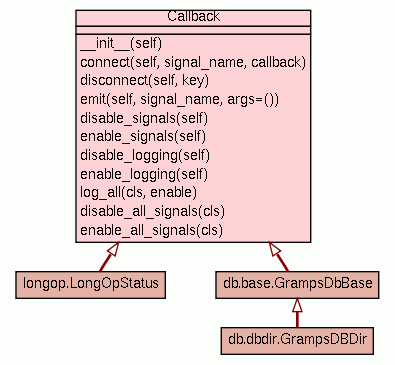Class Callback
source code

Callback and signal support objects.
Declaring signals
Classes that want to emit signals need to inherit from the
DBCallback class and ensure that its __init__ method is called. They
then need to declare the signals that they can emit and the types of
each callbacks arguments. For example:
class TestSignals(Callback):
__signals__ = {
'test-signal' : (int, ),
'test-noarg' : None
}
def __init__(self):
Callback.__init__(self)
The type signature is a tuple of types or classes. The type checking
code uses the isinstance method to check that the argument passed to
the emit call is an instance of the type in the signature
declaration.
If the signal does not have an argument use None as the
signature.
The signals will be inherited by any subclasses. Duplicate signal
names in subclasses are not alowed.
Emitting signals
Signals are emitted using the emit method. e.g.:
def emit_signal(self):
self.emit('test-signal', (1, ))
The parameters are passed as a tuple so a single parameter must be
passed as a 1 element tuple.
Connecting callbacks to signals
Attaching a callback to the signals is similar to the gtk connect
methods. e.g.:
# connect to a function.
def fn(i):
print 'got signal value = ', i
t = TestSignals()
t.connect('test-signal', fn)
# connect to a bound method
class C(object):
def cb_func(self, i):
print 'got class signal = ', 1
r = R()
t.connect('test-signal', r.cb_func)
Disconnecting callbacks
If you want to disconnect a callback from a signals you must
remember the key returned from the connect call. This key can be passed
to the disconnect method to remove the callback from the signals
callback list.
e.g.:
t = TestSignals()
# connect to a bound method
class C(object):
def cb_func(self, i):
print 'got class signal = ', 1
r = R()
key = t.connect('test-signal', r.cb_func)
...
t.disconnect(key)
Stopping and starting signals
Signals can be blocked on a per instance bassis or they can be
blocked for all instances of the Callback class. disable_signals() can
be used to block the signals for a single instance and
disable_all_signals() can be used to block signals for the class:
e.g.:
class TestSignals(Callback):
__signals__ = {
'test-signal' : (int, ),
'test-noarg' : None
}
def __init__(self):
Callback.__init__(self)
def emit_signal(self):
self.emit('test-signal', (1, ))
t = TestSignals()
# block signals from instance t
t.disable_signals()
...
# unblock
t.enable_signals()
# block all signals
Callback.disable_all_signals()
...
# unblock all signals
Callback.enable_all_signals()
Any signals emitted whilst signals are blocked will be lost.
Debugging signal callbacks
To help with debugging the signals and callbacks you can turn on
lots of logging information. To switch on logging for a single instance
call self.enable_logging(), to switch it off again call
self.disable_logging(). To switch on logging for all instance you can
toggle Callback.__LOG_ALL to True.
|
|
__init__(self)
x.__init__(...) initializes x; see x.__class__.__doc__ for signature |
source code
|
|
|
|
|
|
|
disconnect(self,
key)
Disconnect a callback. |
source code
|
|
|
|
emit(self,
signal_name,
args=())
Emit the signal called signal_name. |
source code
|
|
|
|
|
|
|
|
|
|
|
|
|
|
|
Inherited from object:
__delattr__,
__getattribute__,
__hash__,
__new__,
__reduce__,
__reduce_ex__,
__repr__,
__setattr__,
__str__
|
|
Inherited from object:
__class__
|
|
x.__init__(...) initializes x; see x.__class__.__doc__ for
signature
- Overrides:
object.__init__
- (inherited documentation)
|
|
Connect a callable to a signal_name. The callable will be called with
the signal is emitted. The callable must accept the argument types
declared in the signals signature.
returns a unique key that can be passed to disconnect().
|
|
Emit the signal called signal_name. The args must be a tuple of
arguments that match the types declared for the signals signature.
|

